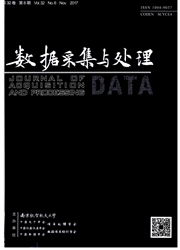

 中文摘要:
中文摘要:
空时自适应处理(Space—time adaptive processing,STAP)是一种有效的机栽雷达运动目标检测方法。空中目标的高速运动会导致其回波产生严重的距离走动和多普勒模糊,并且目标作加速运动时还会导致其多普勒频率随时间变化(即多普勒走动)。为了有效检测上述目标,本文提出了一种新方法,该方法在目标距离走动校正之前首先进行杂波抑制,避免了直接利用Keystone变换校正存在多普勒模糊的运动目标距离走动时影响杂波分布特性,进而降低STAP性能的问题;对距离走动校正后的数据进行修正STAP,估计出目标的加速度,并根据估计值对多普勒走动项进行补偿;最后进行常规空时二维波束形成来实现目标能量积累。仿真结果证明了该方法的有效性。
 英文摘要:
英文摘要:
Space-time adaptive processing (STAP) is an effective method for moving target de-tection in airborne radar. However, fast velocity of air target induces serious range walk and Doppler ambiguity. To make things worse, acceleration of the target will result in Doppler spread. Due to the range walk and Doppler spread of maneuvering air target, the performance of the conventional STAP degrades dramatically. To detect the above mentioned fast air ma- neuvering targets, a new method is proposed, which removes the clutter before Keystone for- matting, hence the effects of Keystone formatting for the ambiguity targetsr range walk com- pensation on the clutter distributions and further on the performance of STAP are avoided. Doppler spread of the target is compensated by the estimated acceleration by a modified opti-mum adaptive processor. Therefore, good detection performance of fast air maneuvering tar-gets can be achieved. Effectiveness of the new method is verified via simulation examples.
 同期刊论文项目
同期刊论文项目
 同项目期刊论文
同项目期刊论文
 期刊信息
期刊信息
